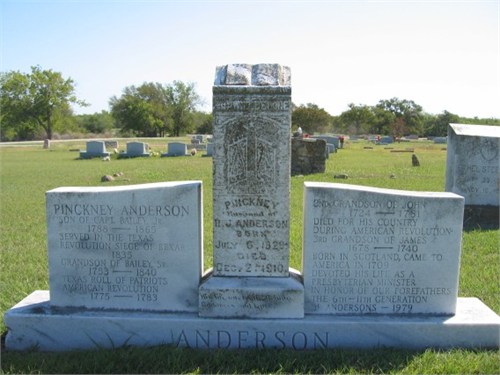In 1805, Bailey Anderson migrated to Warrick Co., IN to became one of the first settlers. Anderson, one of the original Townships of Warrick County, was named after Bailey Anderson. The first official account of any court being held in Warrick County is found in a dilapidated old book in the Clerk's office. This court was held at the house of Bailey Anderson, near the mouth of Cyprus Creek, on the 18th of October 1813, and entitled "The Court of Common Pleas." He served as Associate Judge of the Court of Common Pleas in Warrick County for several years. Bailey Anderson remained in Warrick County until 1817 when he moved to Texas.
He migrated to Clear Creek, Indian Territory, on the Red River, about 1818. In 1820, when U. S soldiers came from Fort Smith, Arkansas Territory, to evict the squatters from Indian Territory, Anderson and his family went to Arkansas Territory, but returned to Texas about 1821 as permanent settlers at Elysian Fields, in present Harrison County, Texas.
Bailey Anderson is also remembered in a cenotaph at Elysian Fields Cemetery.
In 1805, Bailey Anderson migrated to Warrick Co., IN to became one of the first settlers. Anderson, one of the original Townships of Warrick County, was named after Bailey Anderson. The first official account of any court being held in Warrick County is found in a dilapidated old book in the Clerk's office. This court was held at the house of Bailey Anderson, near the mouth of Cyprus Creek, on the 18th of October 1813, and entitled "The Court of Common Pleas." He served as Associate Judge of the Court of Common Pleas in Warrick County for several years. Bailey Anderson remained in Warrick County until 1817 when he moved to Texas.
He migrated to Clear Creek, Indian Territory, on the Red River, about 1818. In 1820, when U. S soldiers came from Fort Smith, Arkansas Territory, to evict the squatters from Indian Territory, Anderson and his family went to Arkansas Territory, but returned to Texas about 1821 as permanent settlers at Elysian Fields, in present Harrison County, Texas.
Bailey Anderson is also remembered in a cenotaph at Elysian Fields Cemetery.
Family Members
-
![]()
Scarlet Anderson
1756–1783
-
Selah "Sela" Anderson Kendall
1758–1848
-
![]()
Joshua Anderson
1760–1783
-
John Anderson Jr
1762–1843
-
Charles Anderson
1762–1818
-
![]()
Dorcas Anderson Barton
1763–1849
-
Charlotte Anderson Chapman
1764–1784
-
![]()
William Pickney Anderson
1765–1845
-
![]()
PVT Vincent Anderson
1768–1836
-
![]()
Jane Tincey Anderson Holland
1769–1859
-
Deliah Anderson
1770–1848
-
Samuel Anderson
1772–1852
-
Alexander Anderson
1776–1850
-
Wyatt Anderson
1771–1833
-
Sarah Andreson Rutherford
1771–1841
-
Sarah Anderson Inglish
1773–1834
-
Joshua Anderson
1775–1839
-
![]()
Delilah Anderson Boon
1777–1848
-
William Anderson
1779 – unknown
-
Elvira Eliza Anderson
1783–1836
-
![]()
Lovisa Anderson
1783–1838
-
James B. Anderson
1785 – unknown
-
![]()
Rebecca Anderson Rone
1786–1851
-
Mary Anderson
1787–1824
-
![]()
Capt Bailey Anderson Jr
1788–1865
-
Lavenia Anderson Kirby
1789–1820
-
![]()
Hampton Anderson
1818–1871




















